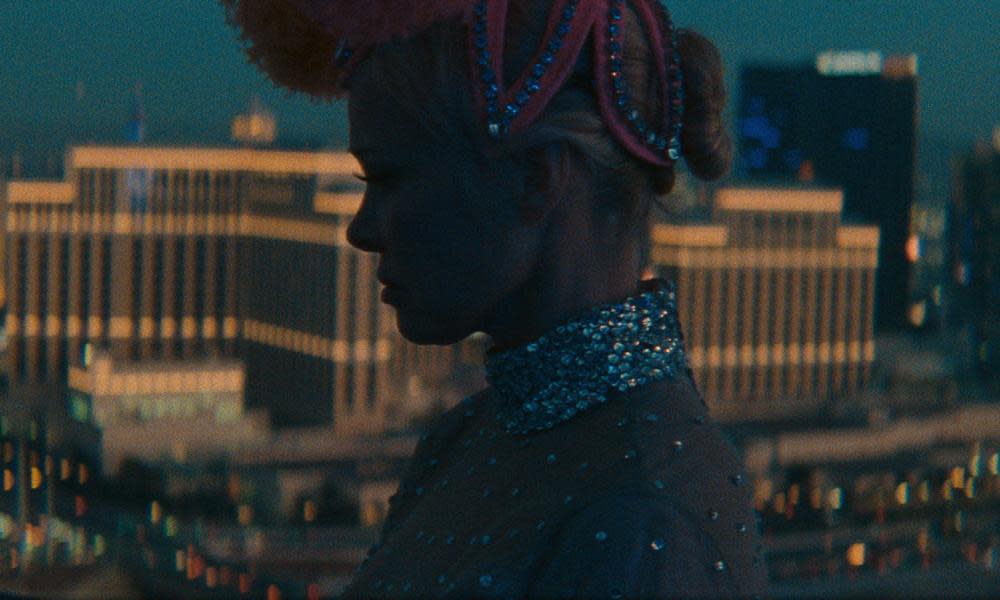The Last Showgirl review – Pamela Anderson’s big comeback is a big disappointment

The desire to see Pamela Anderson receive her flowers after being mistreated and denigrated by numerous parties – from the media to men in the industry to most recently Hulu – is strong enough to initially outweigh other concerns over her big-screen comeback. Even framing it as such feels like an understatement, the star having never received anything like the dramatic lead she’s been given in Vegas-set character drama The Last Showgirl. It’s a genuinely huge moment for Anderson after regaining control of her narrative with a well-received turn in Chicago on Broadway and a likable Netflix documentary which allowed her to right some wrongs.
Related: We Live in Time review – Andrew Garfield and Florence Pugh charm in heartfelt weepie
But while goodwill might have propelled her here, to a ritzy Toronto film festival premiere, it can only take her so far. The film, directed by Francis Ford Coppola’s granddaughter Gia, is wholly unworthy of any hype that might have preceded it, a forgettable, empty trifle at just 85 minutes, failing to give us enough of anything and certainly, sadly, failing to prove Anderson’s mettle as a dramatic actor. It would, inarguably, be a challenge for even the most equipped of performers to make much of TV writer Kate Gersten’s vapid script but it’s truly insurmountable for her. It’s an awkward misjudgment of a performance, the star retreating to the same shticky sitcom excess she used in her short-lived comedy series Stacked, relying on manic overemphasis regardless of the occasion. She just can’t make any of it work and Coppola almost seems aware of this, overstuffing her film with ponderous, dialogue-free scenes of the character looking wistfully off into the distance. Well-shot but dramatically inert, these moments are indicative of the film at large, seeking meaning out of nothingness.
There should theoretically be some easily accessed emotion here, Anderson playing a woman facing the end of a career that had been defined by her sexuality and tackling what comes next. Shelley is a Vegas showgirl whose life has become defined by her work to the detriment of all else, including her estranged daughter (Billie Lourd), and now she must figure out who she is without her long-running show. It’s a similar formula to The Wrestler, a film that also acted as a comeback vehicle for star Mickey Rourke, yet there was texture and soul there as well as a more seasoned performer to build it all around.
Coppola certainly knows how to ape the aesthetics of the all-American Sundance indie and also gives her film a soaring, often rather lovely, score courtesy of Miike Snow frontman and Mark Ronson collaborator Andrew Wyatt (she’s also recruited Miley Cyrus for a big, ballsy final number). But convincing visuals and stirring music can only do so much heavy lifting. There’s no detail or depth to Garsten’s broadest-strokes writing and, rather deadeningly for a character study, no real character for Anderson to take on, just the idea of one (I’d argue that Gina Gershon’s longtime dancer in Showgirls has more substance to her than Shelley).
The commentary on gender and age feels easy and unspecific and the world of the Vegas showgirl created from too great of a distance to really ring true. The city has become a go-to destination for those telling stories of tortured people on the outskirts, for obvious reasons, but we never really get that deep into the heart of it here, mostly seen from distant rooftops. Shelley’s world is inhabited by her fellow showgirls (played by Brenda Song and a particularly effective Kiernan Shipka, maturing into a fine young actor) and her cocktail waitress best friend (played by Jamie Lee Curtis as brash comic relief, doing … a lot). But these relationships are as thinly etched as Shelley is and also strangely dead-ended at times as if an earlier version of the film had been carelessly hacked up (a scene involving a tearful Shipka asking for help has no introduction or resolution while a strange sequence of Curtis dancing to Bonnie Tyler is indulgent and unexplained). The scenes in which Shelley tries to reconnect with her daughter are also flat and overfamiliar, giving us very little reason to emotionally invest in what might happen. The best performance comes from Dave Bautista, as a former lover of Shelley’s who also runs her stage show, the former wrestler graduating into a surprisingly thoughtful character actor.
But the film rests almost entirely on the shoulders of Anderson and while the appeal of such a gamble is certainly enough to attract a curious packed-out festival audience, it just doesn’t feel like a fair ask for an actor so unprepared. She remains a star who deserves a happy ending but The Last Showgirl is not the showstopper it should have been.
The Last Showgirl is screening at the Toronto film festival and is seeking distribution
• This article was amended on 8 September 2024 to correct the fact that Gia Coppola is Francis Ford Coppola’s granddaughter not his daughter.

 Yahoo Movies
Yahoo Movies 
